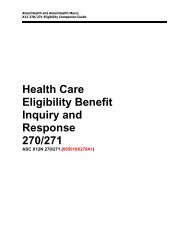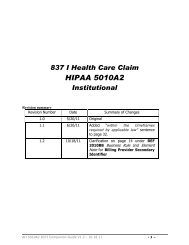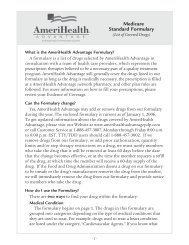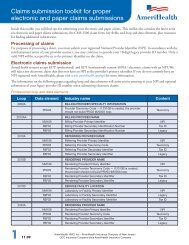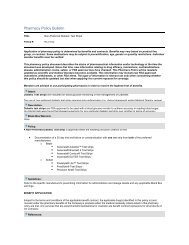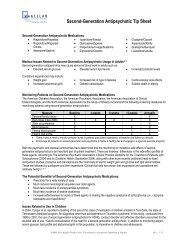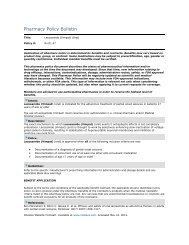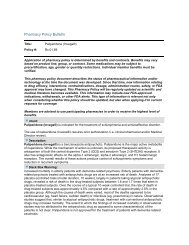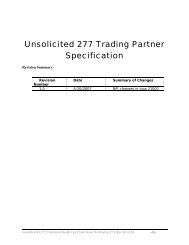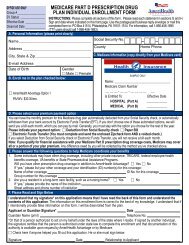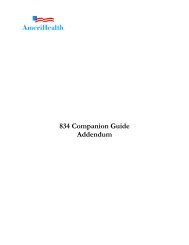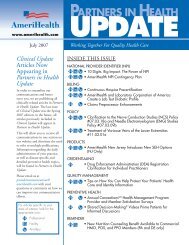Privacy Guide - AmeriHealth.com
Privacy Guide - AmeriHealth.com
Privacy Guide - AmeriHealth.com
You also want an ePaper? Increase the reach of your titles
YUMPU automatically turns print PDFs into web optimized ePapers that Google loves.
HIPAA <strong>Privacy</strong><br />
For our Group Customers and Business Partners<br />
<strong>AmeriHealth</strong> HMO, Inc. • <strong>AmeriHealth</strong> Insurance Company of New Jersey<br />
QCC Insurance Company, d/b/a <strong>AmeriHealth</strong> Insurance Company
HIPAA, The Health Insurance Portability and Accountability Act of 1996, established rights and<br />
protections for health care consumers and created responsibilities for health Plan Sponsors. In<br />
the initial phase, HIPAA provided guidelines to insurers and their customers for minimum standards<br />
of health coverage, the administration of pre-existing conditions and guaranteed renewal for health<br />
insurance products.<br />
HIPAA Title II, also referred to as Administrative Simplification, creates standards that relate to both<br />
the simplification of <strong>com</strong>munication among parties in using electronic transactions and to the privacy<br />
and security of member-specific information.<br />
This brochure focuses on the HIPAA <strong>Privacy</strong> Rule and is developed as an information piece for our<br />
group customers and their business partners to assist you in identifying potential areas for review<br />
and action. The full text of the <strong>Privacy</strong> Rule can be found at http://hhs.gov/ocr/hipaa/finalreg.html<br />
HIPAA <strong>Privacy</strong> Rule—Introduction<br />
The HIPAA <strong>Privacy</strong> Rule, which required <strong>com</strong>pliance by April 14, 2003, was the first <strong>com</strong>prehensive<br />
federal protection for the privacy of individuals’ health information. The U.S. Department of Health<br />
and Human Services Office of Civil Rights is the enforcement agency for the Rule.<br />
The <strong>Privacy</strong> Rule governs the use and disclosure of Protected Health Information (“PHI”), which<br />
is individually identifiable health information. The federal <strong>Privacy</strong> Rule is considered a “floor” of<br />
<strong>Privacy</strong> standards and may be superceded by more stringent state privacy and confidentiality laws<br />
and regulations. Employer sponsored health plans, and in some situations the plan sponsors that<br />
provide certain services in connection with their health plans, will face <strong>com</strong>pliance requirements<br />
from this Rule.<br />
This document should be considered as informational only and is not meant to convey legal<br />
advice or counsel. <strong>AmeriHealth</strong>’s group customers and business partners should involve their<br />
legal counsel to advise and assist them in determining what they must do to meet their<br />
specific obligations under the HIPAA <strong>Privacy</strong> Rule.<br />
i
Table of Contents<br />
Section 1: Overview of HIPAA Title II—Administrative Simplification .......................... 1<br />
Who Must Comply .......................................................................................... 1<br />
Section 2: The <strong>Privacy</strong> Rule .................................................................................... 2<br />
<strong>Privacy</strong> Rule .................................................................................................... 4<br />
Section 3: Specific Requirements for our Group ........................................................ 5<br />
Impact for Fully-Insured Group Health Plans .................................................. 5<br />
Impact for Fully-Insured Group Health Plans that do not Receive PHI.............. 6<br />
Impact for Fully-Insured Group Health Plans that Receive PHI,<br />
Self Insured Plans and Cost Plus Plans ........................................................ 6<br />
Impact for Plan Sponsors ................................................................................ 7<br />
Section 4: Group Health Plans and their Business Associates .................................... 8<br />
Section 5: Your Relationship with <strong>AmeriHealth</strong> under HIPAA ...................................... 9<br />
Section 6: What you should be doing now ................................................................ 10<br />
Self-Check ...................................................................................................... 10<br />
Plan Sponsor .................................................................................................. 10<br />
Group Health Plan .......................................................................................... 10<br />
Section 7: Other “Things to Know” .......................................................................... 11<br />
Notice of <strong>Privacy</strong> Practices .............................................................................. 11<br />
Individual Rights.............................................................................................. 11<br />
Authorizations for Disclosure............................................................................ 11<br />
Accountability and Enforcement ...................................................................... 12<br />
Other Permitted Disclosures ............................................................................ 12<br />
Section 8: Frequently Asked Questions .................................................................... 13<br />
Section 9: Member Notice ...................................................................................... 18<br />
Section10: Member Authorization Form .................................................................... 26<br />
ii
Section 1: Overview of HIPAA Title II—Administrative Simplification<br />
Administrative Simplification is the official name of Title II Subtitle F of the Health Insurance<br />
Portability and Accountability Act of 1996. This provision of the Act defines terms and<br />
requirements for:<br />
Section 1<br />
• Electronic Data Standardization<br />
• Security; and<br />
• <strong>Privacy</strong><br />
Electronic Data Standardization<br />
Today, many providers and health insurance <strong>com</strong>panies exchange information electronically in<br />
hundreds of different formats. Electronic Data Standardization requires that all Covered Entities<br />
use standard formats and standard codes for electronic transactions effective October 16, 2002<br />
or, if they filed for an extension with the Department of Health and Human Services, effective<br />
October 16, 2003.<br />
Security<br />
The Security Rule, which required <strong>com</strong>pliance by April 21, 2005, implemented security<br />
standards to protect and ensure the privacy and confidentiality of individually identifiable<br />
health care information.<br />
<strong>Privacy</strong><br />
The <strong>Privacy</strong> Rule, which required <strong>com</strong>pliance by April 14, 2003, is designed to restrict<br />
the use and disclosure of health related information to appropriate purposes and to ensure<br />
that employee health information is not used against individuals in connection with<br />
their employment.<br />
Who Must Comply<br />
Organizations that are directly affected by the HIPAA regulation are referred to under the law as<br />
covered entities. These include:<br />
• Health plans (including health insurers, HMOs, managed care plans, and group health plans<br />
sponsored by Employers, Health and Welfare Funds, and Associations;<br />
• Healthcare clearinghouses who convert nonstandard formats to <strong>com</strong>pliant transactions; and,<br />
• Healthcare providers who transmit health information in electronic form.<br />
These HIPAA regulations have a number of implications not only for group customers’ health Plan<br />
Sponsors, but also for their agents and brokers, even though they are not “covered entities”.<br />
1
Section 2: The <strong>Privacy</strong> Rule—Key Definitions<br />
The following are some key terms. We urge you to be<strong>com</strong>e familiar with them because they will<br />
help you understand and meet the <strong>com</strong>pliance requirements associated with the rule.<br />
Section 2<br />
Protected Health Information (PHI): Individually identifiable health information, transmitted<br />
or maintained in any form or medium (including electronic media), including demographic<br />
information collected from an individual, that relates to:<br />
• The provision of health care to an individual; or<br />
• The past, present or future physical or mental health or condition of an individual or<br />
payment for the provision of health care to an individual; and<br />
• The information identifies the individual or there is a reasonable basis to believe that<br />
the information can be used to identify the individual.<br />
Summary Health Information: Summary health information is information that may be individually<br />
identifiable information, and that summarizes the claims history, claims expenses, or type of claims<br />
experienced by individuals for whom a plan sponsor (the employer, health and welfare fund or<br />
association that “sponsors” the health benefits plan) has provided health benefits under a group<br />
health plan and from which most identifiers have been removed.<br />
Minimum Necessary: Covered entities generally are required to use, disclose and request only<br />
the minimum necessary PHI to ac<strong>com</strong>plish the purpose of the request. This concept is called<br />
“minimum necessary” under the <strong>Privacy</strong> Rule.<br />
Business Associate: an external nonaffiliated third party, individual or entity that provides<br />
services or assistance to a covered entity related to treatment, payment for treatment, or healthcare<br />
operations. Indirectly, business associates of covered entities are subject to the <strong>Privacy</strong> Rule because<br />
of contractual requirements that are mandated.<br />
ERISA Plan: An employee welfare benefit plan of the Employee Retirement In<strong>com</strong>e and Security Act<br />
of 1974 (ERISA) 29 U.S.C. § 1101 et seq.<br />
Health Plan: An individual or group plan that provides, or pays the costs of medical care. A health<br />
plan includes group health plans, health and welfare funds, health insurers, HMOs, managed care<br />
plans, essentially all government health plans such as FEHB, and public health programs such as<br />
Medicare, Medicare supplemental plans, and Medicaid.<br />
2
Group Health Plan: The <strong>com</strong>ponent of the Employer, Health and Welfare Fund or Association<br />
(group customer) who may require access to other members’ PHI to perform their day-to-day job<br />
functions of administering the overall health benefit plan and health benefits for members of the<br />
group customer. These individuals usually work within the human resources/employee benefits<br />
area of the group customer.<br />
Plan Sponsor: Generally an entity that offers the group health plan to its members (as defined by<br />
the ERISA statute). Representatives of a plan sponsor may be a director, senior executive, or all other<br />
employees who do not require access to members’ PHI to perform their day-to-day job functions.<br />
With minor limitations for enrollment information and Summary Health Information for certain<br />
purposes, access to the members’ PHI by the plan sponsor requires an amendment to the Plan<br />
documents and other <strong>Privacy</strong> Rule <strong>com</strong>pliance obligations.<br />
Section 2<br />
The <strong>Privacy</strong> Rule—Objectives and Requirements<br />
The <strong>Privacy</strong> Rule:<br />
• Gives patients more control over their health information.<br />
• Sets boundaries on the use and release of health records.<br />
• Establishes appropriate safeguards that health care providers, health plans and others<br />
must achieve to protect the privacy of health information.<br />
• Holds violators accountable, with civil and criminal penalties that can be imposed if<br />
they violate an individual’s privacy rights.<br />
• And strikes a balance when public responsibility supports disclosure of some forms<br />
of data—for example to protect public health.<br />
3
The <strong>Privacy</strong> Rule uses the structure created by ERISA, which sets up two distinct <strong>com</strong>ponents within<br />
an entity offering health insurance benefits to employees to set its requirements. These <strong>com</strong>ponents<br />
are the plan sponsor (i.e., the Employer, Health and Welfare Fund or Association) and the group<br />
health plan (i.e., the benefit plan itself, represented by those who administer the plan).<br />
Section 2<br />
The <strong>Privacy</strong> Rule creates a regulatory barrier to restrict the flow of PHI between a group health<br />
plan and the plan sponsor. The primary goal of this separation is to prevent the group customers<br />
from using their employees’ or members’ PHI when making employment-related decisions.<br />
The <strong>Privacy</strong> Rule sets requirements for:<br />
• Establishing policies and procedures, including handling <strong>com</strong>plaints, appointing<br />
a privacy officer, record retention, and providing staff training<br />
• Providing a “Notice of <strong>Privacy</strong> Practices”<br />
• Contracting with “Business Associates”<br />
• Using and disclosing PHI<br />
• Establishing appropriate administrative, technical, and physical safeguards<br />
• Acting promptly to correct a violation or otherwise lessen the harmful effects of<br />
a violation<br />
• Providing a process for individuals to exercise their rights to access their PHI,<br />
amend their PHI, and to restrict the use of their PHI<br />
4
Section 3: Specific Requirements for our Group Customers<br />
and Business Partners<br />
Of the three <strong>com</strong>ponents of Administrative Simplification, the <strong>Privacy</strong> Rule will have the most<br />
impact on our group customers and their business partners. The following section outlines the<br />
impact of this rule.<br />
While the HIPAA <strong>Privacy</strong> Rule does impose new obligations on the entire health care industry,<br />
this Rule does not affect the benefit design of the programs offered by our customers, the services<br />
provided under these programs, the provider networks available to their members or the day-to-day<br />
operations of providing health care benefits.<br />
Group Health Plans and their Plan Sponsors must follow special rules in connection with the<br />
<strong>Privacy</strong> Rule. The <strong>Privacy</strong> Rule does not directly regulate plan sponsors; it does, however, regulate<br />
the group health plans sponsored by these plan sponsors. Where PHI is shared with the Plan<br />
Sponsor, the Rule also imposes obligations on the Plan Sponsor. Therefore, the <strong>Privacy</strong> Rule will<br />
have a direct effect on the health plans of our group customers and in some circumstances, additional<br />
effects on sponsoring entities as well.<br />
Impact for Fully-Insured Group Health Plans<br />
Section 3<br />
A group health plan is subject to limited HIPAA obligations if, and only if, it meets two criteria:<br />
• The plan provides benefits solely through an insurance contract with an insurer<br />
or HMO (i.e., is fully insured); AND<br />
• The plan does not create or receive PHI. (The plan may receive summary health<br />
information or information on whether an individual is enrolled or disenrolled<br />
from an insurer or HMO.)<br />
The limited obligations include:<br />
• Refrain from interfering with employees exercising their rights under the <strong>Privacy</strong> Rule<br />
(e.g., requesting access to or a copy of their health information, filing a privacy <strong>com</strong>plaint);<br />
and,<br />
• Refrain from requiring any person to waive rights under the <strong>Privacy</strong> Rule as a condition<br />
of receiving payment, enrolling in a health plan or being eligible for benefits.<br />
5
Impact for Fully-Insured Group Health Plans that do not Receive PHI<br />
The fully-insured group health plan that does not receive PHI can continue to do the following:<br />
• Perform enrollment functions;<br />
• Receive summary health information for any treatment, payment, or operation purposes;<br />
• Act as an advocate for the member in claim processing issues but may be required to obtain<br />
the individual’s authorization if they wish to avoid additional HIPAA <strong>com</strong>pliance obligations.<br />
Impact for Fully-Insured Group Health Plans that Receive PHI, Self Insured Plans/<br />
Cost Plus Plans<br />
Section 3<br />
Generally, group health plans that fall into this category must fully <strong>com</strong>ply with the <strong>Privacy</strong> Rule in<br />
the same way that a health insurer or provider would have to <strong>com</strong>ply. In addition to the “limited<br />
obligations” (above), fully insured group health plans that receive PHI and self-insured and cost-plus<br />
group health plans must:<br />
• Appoint a privacy official that is responsible for the development and implementation<br />
of the health plan’s policies and procedures;<br />
• Designate a contact person (or office) who is responsible for receiving <strong>com</strong>plaints<br />
filed under the <strong>Privacy</strong> Rule;<br />
• Establish policies and procedures concerning PHI that <strong>com</strong>ply with the <strong>Privacy</strong> Rule;<br />
• Train all members of the workforce on health plan’s PHI policies and procedures;<br />
• Establish appropriate administrative, technical and physical safeguards to protect the<br />
privacy of PHI from intentional or unintentional use or disclosure that violates the<br />
<strong>Privacy</strong> Rule;<br />
• Provide a process for individuals to make <strong>com</strong>plaints concerning the group health<br />
plan’s policies and procedures, or its <strong>com</strong>pliance with its policies and procedures for<br />
the <strong>Privacy</strong> Rule;<br />
• Establish and apply appropriate disciplinary measures against members of its workforce<br />
for violations of the group health plan’s policies and procedures, or the <strong>Privacy</strong> Rule;<br />
• Act promptly to correct a violation or otherwise lessen the harmful effects resulting<br />
from a violation of its policies and procedures about which it has knowledge;<br />
• Prepare and distribute a Notice of <strong>Privacy</strong> Practices to all individuals in the health<br />
plan;<br />
6
• .Provide the individual the right to request access, amendment, accounting, confidential<br />
<strong>com</strong>munications and restrictions of PHI; and<br />
• Retain <strong>com</strong>pliance documentation for six years.<br />
Impact for Plan Sponsors<br />
A plan sponsor’s obligations will vary depending on receipt of:<br />
• no health information at all<br />
• summary health information or<br />
• PHI<br />
If the plan sponsor does not receive any health information at all (neither PHI nor summary health<br />
information), the plan sponsor has no formal <strong>com</strong>pliance obligations under HIPAA Title II.<br />
If the plan sponsor does not receive PHI, but only receives summary health information or information<br />
on whether an individual is enrolled or disenrolled from an insurer or HMO, the impact of the <strong>Privacy</strong><br />
Rule will be minimal. Summary health information may be released to a plan sponsor if the plan<br />
sponsor agrees to only use the information to obtain premium bids for providing health insurance<br />
coverage to the group health plan; or modify, amend or terminate the group health plan.<br />
Section 3<br />
If a plan sponsor receives PHI in order to manage its health benefits program, the <strong>com</strong>pliance<br />
requirements increase dramatically. Before the plan sponsor may receive PHI from either the<br />
group health plan or the insurer, it must “certify” to the group health plan that its plan documents<br />
have been amended to incorporate the following provisions, and that it agrees to abide by them<br />
as follows:<br />
• Only disclose PHI as permitted by the plan documents or as required by law;<br />
• Not use or disclose the PHI for employment-related actions or decisions, or in connection<br />
with any other benefit or employee benefit plan of the sponsor;<br />
• Ensure that “adequate separation” of records and employees is established and maintained<br />
between the group health plan and the plan sponsor;<br />
• Ensure (through a written contract) that the plan sponsor’s agents and subcontractors<br />
(e.g., benefits consultants) agree to abide by the same restrictions and conditions as the<br />
plan sponsor in regard to the use of PHI received from the group health plan;<br />
• Report any improper use or disclosure of PHI to the group health plan;<br />
• Allow individuals to inspect and obtain copies of PHI about themselves;<br />
7
• Allow individuals to request to amend PHI about themselves;<br />
• Provide individuals with an accounting of disclosures of PHI made within the six years<br />
prior to the request for such accounting; and<br />
• Make its internal practices, books and records relating to the use and disclosure of PHI<br />
available to the Department of Health and Human Services (HHS) for purposes of auditing<br />
the group health plan’s <strong>com</strong>pliance with the <strong>Privacy</strong> Rule.<br />
NOTE: Regardless of which of the above categories the group customer falls into, you<br />
should take special care to protect any member health information to ensure<br />
that this information is used only for appropriate purposes.<br />
Section 4: Group Health Plans and their Business Associates<br />
When group health plans have taken the necessary steps to be<strong>com</strong>e HIPAA <strong>com</strong>pliant based on<br />
their fully-insured or self-insured status as well as the amount of PHI they elect to receive or create,<br />
they must take steps to require their business associates to be HIPAA-<strong>com</strong>pliant as well. A business<br />
associate is an external nonaffiliated third party that the covered entity contracts with to perform a<br />
covered function(s) on its behalf involving the use or disclosure of PHI. For example, an insurer<br />
that provides third party administration for a self-insured plan is the business associate of the selfinsured<br />
plan.<br />
Section 4<br />
Group health plans that share PHI with their business associates must obtain “satisfactory assurance”<br />
that their business associate will safeguard their enrollees’ PHI. This is ac<strong>com</strong>plished by executing a<br />
written contract or contract amendment with its business associates, which contractually obligates<br />
the business associate to protect the PHI that they create, receive, use or disclose. Therefore, the<br />
business associate contracts must specify that the business associate:<br />
• Must use and disclose PHI only as permitted by the contract with the group health plan<br />
and consistent with the <strong>Privacy</strong> Rule;<br />
• Must implement data privacy and security safeguards;<br />
• Must ensure any agents or subcontractors they employ to assist in fulfilling their contract<br />
obligations to the group health plan adhere to the same restrictions;<br />
• Must provide enrollees with access, amendment and disclosure accounting upon request;<br />
8
• Must report improper use or disclosure of PHI to the group health plan<br />
• Must make its books and records available to the Department of Health and Human Services<br />
(DHHS) upon request;<br />
• Must return or destroy PHI at the end of the contract if feasible to do so. If not feasible,<br />
the business associate must ensure that no improper use or disclosure of PHI occurs.<br />
Section 5: Your Relationship with <strong>AmeriHealth</strong> under HIPAA<br />
<strong>AmeriHealth</strong> has spent significant time examining how the HIPAA Title II regulations affect our<br />
business relationship with our group customers and business partners. We believe the policies<br />
<strong>AmeriHealth</strong> has developed to ensure <strong>com</strong>pliance will allow both <strong>AmeriHealth</strong> and our group<br />
customers and their business partners to continue to provide health care benefits with minimal<br />
disruption to the service you and your members enjoy from <strong>AmeriHealth</strong>.<br />
The following outlines the procedures we will follow in responding to specific requests from our<br />
group customers for PHI regarding an individual member, as part of the Plan’s efforts to provide<br />
assistance to individual employees or members. Under HIPAA, <strong>AmeriHealth</strong> will only provide<br />
Protected Health Information (PHI) on an individual member to a group health plan as follows:<br />
• We will inform the group health plan representative that we will take his/her question<br />
or issue, but will return the call directly to the member; or<br />
• If the member is in the presence of the group health plan representative while he/she is<br />
attempting to contact us, we will accept a verbal authorization from the member, note that<br />
in our records, then discuss the issue with the health plan representative and member; or<br />
• If the first and second options listed above are not possible, we will ask the group health<br />
plan representative to fax us an authorization <strong>com</strong>pleted by the member that will allow<br />
us to disclose PHI to the person designated on the authorization form.<br />
Section 5<br />
9
Section 6<br />
Section 6: What you should be doing now<br />
Before deciding the path your <strong>com</strong>pany will take to be<strong>com</strong>e <strong>com</strong>pliant, you must first understand<br />
and analyze the HIPAA Title II <strong>Privacy</strong> Rule as it applies to your health benefit plan(s). By answering<br />
the following questions, you can begin to plan your strategy:<br />
Self-Check<br />
• Is the plan fully insured, or self-insured/cost-plus?<br />
• Does the group customer rely on an insurer to handle day-to-day operations of the plan?<br />
Or does the group customer use a traditional third-party administrator?<br />
• How involved is the group customer in the operation of the plan?<br />
• What kinds of information does the group customer receive about members enrolled<br />
in its group health plan?<br />
Next, assess whether your <strong>com</strong>pany plan sponsor or group health plan requires PHI by<br />
answering the following:<br />
Plan Sponsor<br />
• Does the group customer, as Plan Sponsor, wish to be involved in the overall<br />
management of the group health plan?<br />
• If so, can the Plan Sponsor ac<strong>com</strong>plish its business goals by performing the plan<br />
administration functions without receiving any PHI?<br />
• If the Plan Sponsor feels that it must receive or use PHI to achieve its goals, then<br />
the Plan Sponsor will need to <strong>com</strong>ply with the HIPAA <strong>Privacy</strong> requirements outlined<br />
in this booklet in order to receive PHI either from the group health plan directly or<br />
from an insurer or other entity involved in administering the plan.<br />
Group Health Plan<br />
• Is the plan fully insured or self-insured/cost-plus?<br />
• If fully insured, does the group health plan need to receive PHI to administer the<br />
health plan?<br />
• If the plan is fully insured and does not receive PHI, other than enrollment or summary<br />
health information, then the plan may be able to avoid many of the <strong>com</strong>pliance obligations<br />
imposed by HIPAA. If the fully insured plan does receive PHI, it will need to <strong>com</strong>ply with<br />
the full range of requirements imposed by HIPAA.<br />
• If self-insured or cost-plus, how will the plan meet all of the HIPAA <strong>com</strong>pliance obligations?<br />
10
Section 7: Other “Things to Know”<br />
Notice of <strong>Privacy</strong> Practices<br />
<strong>AmeriHealth</strong> initially published the Notice of <strong>Privacy</strong> Practices as an insert in the UPDATE magazine<br />
that was mailed to all existing subscribers by the end of the first quarter 2003. Additionally, after<br />
the first quarter 2003, the Notice of <strong>Privacy</strong> Practices is included in new member enrollment packets.<br />
As required by the <strong>Privacy</strong> Rule, a copy of the Notice of <strong>Privacy</strong> Practices is published on the<br />
amerihealth.<strong>com</strong> web-site and <strong>AmeriHealth</strong> sends a reminder of the availability of the Notice to all<br />
subscribers at least every three years. A copy of <strong>AmeriHealth</strong>’s Notice of <strong>Privacy</strong> Practices is included<br />
in Section 9 of this guide.<br />
Section 7<br />
Individual Rights<br />
The <strong>Privacy</strong> Rule provides an individual with rights to:<br />
• access their protected health information,<br />
• amend their protected health information,<br />
• request an accounting of disclosures of their protected health information,<br />
• request confidential <strong>com</strong>munications,<br />
• request restrictions to the use or disclosure of their protected health information.<br />
<strong>AmeriHealth</strong> will handle all requests for “Member Rights”—Access, Amendment, Accounting,<br />
Confidential Communication and Restrictions of PHI BUT <strong>AmeriHealth</strong> will notify the<br />
member that <strong>AmeriHealth</strong> may not have all of the information and the member should<br />
contact their group health plan.<br />
<strong>AmeriHealth</strong> may impose a reasonable fee on the individual for access requests and for more than<br />
one accounting request within 12 months. <strong>AmeriHealth</strong> will allow the individual to modify the<br />
request to avoid any applicable fees.<br />
Authorizations for Disclosure<br />
As stated in this booklet, individual authorizations must be obtained prior to the release of PHI for<br />
the purpose of resolving member concerns or for certain purposes permitted by the <strong>Privacy</strong> Rule.<br />
Generally, an individual authorization is voluntary and must be <strong>com</strong>pleted by the individual in<br />
clear and understandable language prior to any disclosure. <strong>AmeriHealth</strong> will make an authorization<br />
form available to you to use with your employees/members. <strong>AmeriHealth</strong> reserves the right to<br />
request an authorization before any disclosure including those for treatment, payment and health<br />
care operations.<br />
A sample authorization is included in this mailing. Additional copies are available on the<br />
amerihealth.<strong>com</strong> web-site or via your marketing representative.<br />
11
Accountability and Enforcement<br />
Covered entities that violate the <strong>Privacy</strong> Rule requirements are subject to penalties under HIPAA<br />
as indicated below. Enforcement will be through the Department of Health and Human Services<br />
Office of Civil Rights.<br />
• Civil penalties are $100 per incident, up to $25,000 per violation per year per standard.<br />
Section 7<br />
• Federal criminal penalties exist for covered entities that knowingly and improperly disclose<br />
information or obtain information under false pretenses. Criminal penalties include fines up<br />
to $50,000 and one year in prison for improperly obtaining or disclosing PHI; up to $100,000<br />
and up to five years in prison for obtaining PHI under “false pretenses”; and up to $250,000<br />
and up to 10 years in prison for obtaining or disclosing PHI with the intent to sell, transfer<br />
or use it for <strong>com</strong>mercial advantage, personal gain or malicious harm.<br />
• There is no statutory authority for a private right of action for individuals to enforce their<br />
<strong>Privacy</strong> Rights.<br />
Other Permitted Disclosures<br />
The <strong>Privacy</strong> Rule permits certain disclosures of PHI without individual authorization for certain<br />
national priority activities and for activities that allow the health care system to operate more<br />
smoothly. These activities include:<br />
• Oversight of the health care system, including quality assurance activities;<br />
• Public Health, reporting of disease and vital statistics;<br />
• Research, generally limited to when a waiver of authorization is independently approved<br />
by a <strong>Privacy</strong> board or Institutional Review Board;<br />
• Judicial and administrative proceedings;<br />
• Limited law enforcement activities;<br />
• Emergency circumstances;<br />
• Identification of a deceased person or to determine the cause of death;<br />
• Inclusion in facility patient directories;<br />
• Activities related to national defense and security.<br />
12
Section 8: Frequently Asked Questions<br />
What is HIPAA?<br />
HIPAA stands for the Health Insurance Portability and Accountability Act of 1996. It established<br />
rights and protections for health care consumers and created responsibilities for health insurers such<br />
as <strong>AmeriHealth</strong> and Keystone Health Plan East, health Plan Sponsors and their group health plans.<br />
What is Administrative Simplification?<br />
HIPAA Title II, also referred to as Administrative Simplification, creates standards that relate to both<br />
the simplification of <strong>com</strong>munication among parties in using electronic transactions and to the privacy<br />
and security of member-specific information.<br />
What is the <strong>Privacy</strong> Rule?<br />
The <strong>Privacy</strong> Rule, a subset of Title II Administrative Simplification, governs the use and disclosure<br />
of Protected Health Information (“PHI”).<br />
How is “PHI” defined?<br />
Section 8<br />
PHI is individually identifiable health information, transmitted or maintained in any form or medium<br />
(including electronic media). It includes demographic information collected from an individual that<br />
relates to the past, present or future physical or mental health condition of an individual or the<br />
provision or payment of health care. Essentially, for group health plans and health insurers, this<br />
means any individually identifiable information about health plan members.<br />
This phrase (and the <strong>Privacy</strong> Rule itself) does not usually apply to health care information held by<br />
employers about their employees that is obtained in connection with employer functions outside<br />
of the operation of a health plan—such as employment applications, disability management and<br />
worker’s <strong>com</strong>pensation.<br />
Is HIPAA the only <strong>Privacy</strong> Law?<br />
HIPAA is a federal privacy law that sets a minimum national privacy standard. State(s) may enact<br />
privacy laws that provide greater privacy protections than HIPAA. Other federal laws also may be<br />
relevant in some situations.<br />
13
Are there penalties for not <strong>com</strong>plying with the HIPAA requirements?<br />
Yes. There are both civil fines and criminal penalties, including imprisonment. The civil fines are<br />
$100 per violation, up to $25,000 a year for each standard violated. Criminal penalties for knowing<br />
misuse of protected health information may be as high as $50,000 and one year of imprisonment.<br />
There are higher criminal penalties for false pretenses and for intent to sell information.<br />
What HIPAA Means to Me<br />
Who is affected by the HIPAA <strong>Privacy</strong> Rule?<br />
The HIPAA law requires covered entities to <strong>com</strong>ply with the <strong>Privacy</strong> Rule. Covered entities<br />
include Health Plans (including health insurers, HMOs, managed care plans, and group health<br />
plans sponsored by Employers, Health and Welfare Funds, and Associations); health care clearing<br />
houses; and healthcare providers.<br />
Section 8<br />
Is the Plan Sponsor of the Group Health Plan the covered entity?<br />
Employers, health and welfare funds and associations (“group customers”) that sponsor group health<br />
plans are not “covered entities” under HIPAA. The covered entity is the group health plan and not<br />
the employer itself. The group health plan is treated as a <strong>com</strong>ponent within the group customer that<br />
provides medical benefits directly or through insurance.<br />
Do group customers need to worry about <strong>com</strong>plying with HIPAA?<br />
What if I’m a small group customer?<br />
Almost every group customer that offers health benefits to its members will feel some effect from<br />
the HIPAA <strong>Privacy</strong> Rule. The extent of these obligations will depend on the financing structure of<br />
the health plan and the type of PHI received by the health plan, as well as whether the plan sponsor<br />
also receives PHI from the health plan. There is no exception for small employers, although in some<br />
situations small employers may have certain additional time to <strong>com</strong>ply with the Rule.<br />
What are my organization’s obligations under HIPAA?<br />
Group Health Plans and their Plan Sponsors must follow special rules in connection with the<br />
<strong>Privacy</strong> Rule. The Group Health Plan is a “covered entity” that must meet at least some HIPAA<br />
<strong>Privacy</strong> Rule obligations in all instances. Where PHI is shared with the Plan Sponsor, the Rule<br />
also imposes separate significant <strong>com</strong>pliance obligations on the Plan Sponsor. Therefore, the<br />
<strong>Privacy</strong> Rule will have a direct effect on the health plans of our group customers and in some<br />
circumstances, additional effects on sponsoring entities as well.<br />
14
Can a group health plan limit its obligations under HIPAA?<br />
A group health is subject to limited HIPAA <strong>com</strong>pliance obligations if, and only if, it meets<br />
these criteria:<br />
1. The plan is fully-insured AND<br />
2. The plan does not create or receive protected health information. All other Group Health<br />
Plans (meaning any self-insured group health plan or a fully insured plan that receives PHI)<br />
must <strong>com</strong>ply with all requirements of the <strong>Privacy</strong> Rule.<br />
An insured group health plan can continue to limit its HIPAA <strong>com</strong>pliance obligations if it only<br />
receives summary health information or information on whether an individual is enrolled or<br />
disenrolled from an insurer or HMO.<br />
What are the limited obligations?<br />
Every group customer must have a policy to refrain from interfering with employees exercising their<br />
rights under the <strong>Privacy</strong> Rule, e.g., requesting access to or a copy of their health information, filing<br />
a privacy <strong>com</strong>plaint, etc. and to refrain from requiring any person to waive rights under the <strong>Privacy</strong><br />
Rule as a condition of receiving payment, enrolling in a health plan or being eligible for benefits.<br />
Section 8<br />
What happens if the Plan Sponsor receives PHI?<br />
Before the plan sponsor may receive PHI from either the group health plan or the insurer, it must<br />
“certify” to the group health plan that its plan documents have been amended to incorporate the<br />
required HIPAA provisions, and, that it agrees to abide by them. These required provisions track<br />
many of the requirements imposed on group health plans and insurers, and create some specific<br />
additional obligations for plan sponsors (including the requirement that the plan sponsor/employer<br />
not use PHI in connection with employment-related decisions).<br />
I heard that contracts with brokers and consultants need to be changed, is that true?<br />
Under the HIPAA <strong>Privacy</strong> rule, if a Group Health Plan contracts with someone who will use or<br />
disclose PHI while performing services on your behalf, there are additional contract requirements.<br />
This contractor is called a “business associate” under the <strong>Privacy</strong> Rule. Specifically, the group<br />
health plan must enter into a Business Associate Agreement with each entity that provides<br />
services or assistance to a covered entity when such services or existence relate to treatment,<br />
payment for treatment or healthcare operations.<br />
15
Do I need to change the way I handle medical information relating to<br />
pre-employment physicals, fitness-for-duty, drug-free workplace tests, etc.?<br />
Plan Sponsors/employers generally can continue to engage in activities that involve employee<br />
medical information, as long as this information is not obtained from the group health plan.<br />
Accordingly, when an employer conducts pre-employment physicals, for example, the HIPAA<br />
<strong>Privacy</strong> Rule is not implicated.<br />
In certain situations, a physician conducting these physicals may be a covered provider under<br />
HIPAA and therefore may require the employee to provide a HIPAA authorization before he<br />
or she will release the health information to the employer. However, once the employer receives<br />
the information, it be<strong>com</strong>es part of the employment file and is not considered PHI.<br />
How does HIPAA affect medical information relating to workers’ <strong>com</strong>pensation cases?<br />
Section 8<br />
HIPAA has a special rule permitting an employer to release information from its group health plan<br />
for purposes of <strong>com</strong>plying with State and Federal workers’ <strong>com</strong>pensation laws. The disclosure must<br />
only include that information that is “authorized by” and “necessary to <strong>com</strong>ply with” the relevant<br />
law. Information obtained outside of the health plan for workers <strong>com</strong>pensation claims (for example,<br />
from the employee directly) is not subject to the <strong>Privacy</strong> Rule.<br />
Your Relationship with <strong>AmeriHealth</strong> under HIPAA<br />
Will I still be able to help my members resolve their claims issues?<br />
Yes, you can continue to act as an advocate for the member in claims processing issues, but will<br />
have to obtain the member’s authorization before <strong>AmeriHealth</strong> will discuss the issue with you.<br />
<strong>AmeriHealth</strong> has developed an authorization form for our members’ use (a copy of which is included<br />
in this packet and which is also available on our website www.amerihealth.<strong>com</strong>).<br />
Will <strong>AmeriHealth</strong> be providing a <strong>Privacy</strong> Notice to members enrolled in the group health plan?<br />
<strong>AmeriHealth</strong> will include its Notice of <strong>Privacy</strong> Practices as an insert in the spring member newsletter(s)<br />
that are mailed to all subscribers. The Notice of <strong>Privacy</strong> Practices will then be included<br />
in new member enrollment packets. <strong>AmeriHealth</strong> will handle all requests for “Member Rights”—<br />
including Access, Amendment, Accounting, Confidential Communication and Restrictions of PHI<br />
BUT <strong>AmeriHealth</strong> will notify the member that <strong>AmeriHealth</strong> may not have all of the information and<br />
the member should contact their group health plan as well.<br />
16
What You Should Be Doing Now<br />
How do I get started?<br />
Before deciding the path your <strong>com</strong>pany will take to be<strong>com</strong>e <strong>com</strong>pliant, you should first understand<br />
the HIPAA Title II <strong>Privacy</strong> Rule as it applies to your health benefit plan(s). This will involve determining<br />
whether your <strong>com</strong>pany sponsors a group health plan, what kind of funding mechanism<br />
is in place for the group health plan and whether the group health plan receives, uses or discloses<br />
PHI in the operation of that Plan. You may wish to consult your legal counsel on these issues.<br />
Where can I obtain a copy of the HIPAA regulations?<br />
The <strong>Privacy</strong> regulations are available at www.hhs.gov/ocr/hipaa/finalreg.html. For information about<br />
the other final and proposed Administrative Simplification regulations, see aspe.hhs.gov/admnsimp/.<br />
Section 8<br />
17
Section 9: Member Notice<br />
<strong>AmeriHealth</strong> Notice of <strong>Privacy</strong> Practices*<br />
This notice describes how medical information about you may be used and disclosed and how<br />
you can get access to this information.<br />
Please review it carefully.<br />
This Notice takes effect on April 14, 2003.<br />
<strong>AmeriHealth</strong> values you as a customer, and protection of your privacy is very important to us.<br />
In conducting our business, we will create and maintain records that contain protected health<br />
information about you and the health care provided to you as a member of our health plans.<br />
“Protected health information” or “PHI” is information about you, including information about<br />
where you live, that can reasonably be used to identify you and that relates to your past, present<br />
or future physical or mental health or condition, the provision of health care to you or the payment<br />
for that care.<br />
We protect your privacy by:<br />
• limiting who may see your PHI,<br />
• limiting how we may use or disclose your PHI,<br />
Section 9<br />
• informing you of our legal duties with respect to your PHI,<br />
• explaining our privacy policies, and<br />
• adhering to the policies currently in effect.<br />
This Notice describes our privacy practices, which include how we may use, disclose, collect, handle,<br />
and protect our members’ protected health information. We are required by certain federal and<br />
state laws to maintain the privacy of your protected health information. We also are required by the<br />
federal Health Insurance Portability and Accountability Act (or “HIPAA”) <strong>Privacy</strong> Rule to give you<br />
this Notice about our privacy practices, our legal duties, and your rights concerning your protected<br />
health information.<br />
This Notice takes effect on April 14, 2003, and will remain in effect until we replace or modify it.<br />
*If you are enrolled in a self-insured group benefit program, this Notice is not applicable. If you are enrolled in such a program, you<br />
should contact your Group Benefit Manager for information about your group’s privacy practices.<br />
18
Copies of this Notice<br />
You may request a copy of our Notice at any time. If you want more information about our privacy<br />
practices, or have questions or concerns, please contact Member Services by calling the telephone<br />
number on the back of your Member Identification Card, or contact us using the contact information<br />
at the end of this Notice.<br />
Changes to this Notice<br />
The terms of this Notice apply to all records that are created or retained by us which contain your<br />
PHI. We reserve the right to revise or amend the terms of this Notice. A revised or amended Notice<br />
will be effective for all of the PHI that we already have about you, as well as for any PHI we may<br />
create or receive in the future. We are required by law to <strong>com</strong>ply with whatever <strong>Privacy</strong> Notice is<br />
currently in effect. You will be notified of any material change to our <strong>Privacy</strong> Notice before the<br />
change be<strong>com</strong>es effective. When necessary, a revised Notice will be mailed to the address that we<br />
have on record for the contract holder of your member contract, and will also be posted on our<br />
web site at www.amerihealth.<strong>com</strong>.<br />
Potential Impact of State Law<br />
The HIPAA <strong>Privacy</strong> Rule generally does not “preempt” (or take precedence over) state privacy or<br />
other applicable laws that provide individuals greater privacy protections. As a result, to the extent<br />
state law applies, the privacy laws of a particular state, or other federal laws, rather than the HIPAA<br />
<strong>Privacy</strong> Rule, might impose a privacy standard under which we will be required to operate. For<br />
example, where such laws have been enacted, we will follow more stringent state privacy laws that<br />
relate to uses and disclosures of the protected health information concerning HIV or AIDS, mental<br />
health, substance abuse/chemical dependency, genetic testing, reproductive rights, etc.<br />
How We May Use and Disclose Your Protected Health Information (PHI)<br />
Section 9<br />
In order to administer our health benefit programs effectively, we will collect, use and disclose PHI<br />
for certain of our activities, including payment of covered services and health care operations.<br />
The following categories describe the different ways in which we may use and disclose your PHI.<br />
Please note that every permitted use or disclosure of your PHI is not listed below. However, the<br />
different ways we will, or might, use or disclose your PHI do fall within one of the permitted<br />
categories described below.<br />
Payment: We may use and disclose your PHI for all payment activities including, but not limited<br />
to, collecting premiums or to determine or fulfill our responsibility to provide health care coverage<br />
under our health plans. This may include coordinating benefits with other health care programs or<br />
insurance carriers, such as Medicare or Medicaid. For example, we may use and disclose your PHI<br />
to pay claims for services provided to you by doctors or hospitals which are covered by your health<br />
plan(s), or to determine if requested services are covered under your health plan. We may also use<br />
and disclose your PHI to conduct business with other <strong>AmeriHealth</strong> affiliate <strong>com</strong>panies.<br />
19
Health Care Operations: We may use and disclose your PHI to conduct and support our business<br />
and management activities as a health insurance issuer. For example, we may use and disclose your<br />
PHI to determine our premiums for your health plan, to conduct quality assessment and improvement<br />
activities, to conduct business planning activities, to conduct fraud detection programs, to conduct<br />
or arrange for medical review, or to engage in care coordination of health care services. We may also<br />
use and disclose your PHI to offer you one of our value added programs like smoking cessation or<br />
discounted health related services, or to provide you with information about one of our disease<br />
management programs or other available <strong>AmeriHealth</strong> health products or health services.<br />
We may also use and disclose your PHI to provide you with reminders to obtain preventive health<br />
services, and to inform you of treatment alternatives and/or health related benefits and services that<br />
may be of interest to you.<br />
Marketing: We may use your PHI to make a marketing <strong>com</strong>munication to you that is in the form<br />
of (a) a face-to-face <strong>com</strong>munication, or (b) a promotional gift of nominal value.<br />
Release of Information to Plan Sponsors: Plan sponsors are employers or other organizations that<br />
sponsor a group health plan. We may disclose PHI to the plan sponsor of your group health plan<br />
as follows:<br />
• We may disclose “summary health information” to your plan sponsor to use to obtain<br />
premium bids for providing health insurance coverage or to modify, amend or terminate<br />
its group health plan. “Summary health information” is information that summarizes claims<br />
history, claims expenses, or types of claims experience for the individuals who participate in<br />
the plan sponsor’s group health plan;<br />
Section 9<br />
• We may disclose PHI to your plan sponsor to verify enrollment/disenrollment in your group<br />
health plan;<br />
• We may disclose your PHI to the plan sponsor of your group health plan so that the plan<br />
sponsor can administer the group health plan; and<br />
• If you are enrolled in a group health plan, your plan sponsor may have met certain requirements<br />
of the HIPAA <strong>Privacy</strong> Rule that will permit us to disclose PHI to the plan sponsor.<br />
Sometimes the plan sponsor of a group health plan is the employer. In those circumstances,<br />
we may disclose PHI to your employer. You should talk to your employer to find out how<br />
this information will be used.<br />
Research: We may use or disclose your PHI for research purposes if certain conditions are met.<br />
Before we disclose your PHI for research purposes without your written permission, an Institutional<br />
Review Board (a board responsible under federal law for reviewing and approving research involving<br />
human subjects) or <strong>Privacy</strong> Board reviews the research proposal to ensure that the privacy of your<br />
PHI is protected, and to approve the research.<br />
20
Required by Law: We may disclose your PHI when required to do so by applicable law. For example,<br />
the law requires us to disclose your PHI:<br />
• When required by the Secretary of the U.S. Department of Health and Human Services to<br />
investigate our <strong>com</strong>pliance efforts; and<br />
• To health oversight agencies, to allow them to conduct audits and investigations of the health<br />
care system, to determine eligibility for government programs, to determine <strong>com</strong>pliance with<br />
government program standards, and for certain civil rights enforcement actions.<br />
Public Health Activities: We may disclose your PHI to public health agencies for public health<br />
activities that are permitted or required by law, such as to:<br />
• prevent or control disease, injury or disability;<br />
• maintain vital records, such as births and deaths;<br />
• report child abuse and neglect;<br />
• notify a person about potential exposure to a <strong>com</strong>municable disease;<br />
• notify a person about a potential risk for spreading or contracting a disease or condition;<br />
• report reactions to drugs or problems with products or devices;<br />
• notify individuals if a product or device they may be using has been recalled; and<br />
• notify appropriate government agency(ies) and authority(ies) about the potential abuse or<br />
neglect of an adult patient, including domestic violence.<br />
Health Oversight Activities: We may disclose your PHI to a health oversight agency for activities<br />
authorized by law, such as: audits; investigations; inspections; licensure or disciplinary actions; or<br />
civil, administrative, or criminal proceedings or actions. Health Oversight agencies seeking this<br />
information include government agencies that oversee: (i) the health care system; (ii) government<br />
benefit programs; (iii) other government regulatory programs; and (iv) <strong>com</strong>pliance with civil rights<br />
laws.<br />
Section 9<br />
Lawsuits and Other Legal Disputes: We may disclose your PHI in response to a court or administrative<br />
order, subpoena, discovery request, or other lawful process once we have met all administrative<br />
requirements of the HIPAA <strong>Privacy</strong> Rule.<br />
Law Enforcement: We may disclose your PHI to law enforcement officials under certain conditions.<br />
For example, we may disclose PHI:<br />
• to permit identification and location of witnesses, victims, and fugitives;<br />
• in response to a search warrant or court order;<br />
• as necessary to report a crime on our premises;<br />
21
• to report a death that we believe may be the result of criminal conduct; or<br />
• in an emergency, to report a crime.<br />
Coroners, Medical Examiners, or Funeral Directors: We may release PHI to a coroner or medical<br />
examiner. This may be necessary, for example, to identify a deceased person or to determine the<br />
cause of death. We also may disclose, as authorized by law, information to funeral directors so that<br />
they may carry out their duties.<br />
Organ and Tissue Donation: We may use or disclose your PHI to organizations that handle organ<br />
and tissue donation and distribution, banking, or transplantation.<br />
To Prevent a Serious Threat to Health or Safety: As permitted by law, we may disclose your PHI<br />
if we believe that the disclosure is necessary to prevent or lessen a serious and imminent threat to<br />
the health or safety of a person or the public.<br />
Military and National Security: We may disclose to military authorities the PHI of Armed Forces<br />
personnel under certain circumstances. We may disclose to authorized federal officials PHI required<br />
for lawful intelligence, counter-intelligence, and other national security activities.<br />
Inmates: If you are a prison inmate, we may disclose your PHI to the prison or to a law enforcement<br />
official for: (1) the prison to provide health care to you; (2) your health and safety, and the health and<br />
safety of others; or (3) the safety and security of the prison.<br />
Workers’ Compensation: As part of your workers’ <strong>com</strong>pensation claim, we may have to disclose<br />
your PHI to a worker’s <strong>com</strong>pensation carrier.<br />
Section 9<br />
To You: When you ask us to, we will disclose to you your PHI that is in a “designated record set.”<br />
Generally, a designated record set contains medical, enrollment, claims and billing records we may<br />
have about you, as well as other records that we use to make decisions about your health care benefits.<br />
You can request the PHI from your designated record set as described in the section below called<br />
“Your <strong>Privacy</strong> Rights Concerning your Protected Health Information.”<br />
To Your Personal Representative: If you tell us to, we will disclose your PHI to someone who is<br />
qualified to act as your personal representative according to any relevant state laws. In order for us<br />
to disclose your PHI to your personal representative, you must send us a <strong>com</strong>pleted <strong>AmeriHealth</strong><br />
Personal Representative Designation Form or documentation that supports the person’s qualification<br />
according to state law (such as a power of attorney or guardianship). To request the <strong>AmeriHealth</strong><br />
Personal Representative Designation Form, please contact Member Services at the telephone<br />
number listed on the back of your Member Identification card, print the form from our web site<br />
at www.amerihealth.<strong>com</strong>, or write us at the address at the end of this Notice. However, the HIPAA<br />
<strong>Privacy</strong> Rule permits us to choose not to treat that person as your personal representative when we<br />
have a reasonable belief that: (i) you have been, or may be, subjected to domestic violence, abuse<br />
or neglect by the person; (ii) treating the person as your personal representative could endanger<br />
you; or (iii) in our professional judgment, it is not in your best interest to treat the person as your<br />
personal representative.<br />
22
To Family and Friends: Unless you object, we may disclose your PHI to a friend or family member<br />
who has been identified as being involved in your health care. We also may disclose your PHI to<br />
an entity assisting in a disaster relief effort so that your family can be notified about your condition,<br />
status, and location. If you are not present or able to agree to these disclosures of your PHI, then<br />
we may, using our professional judgment, determine whether the disclosure is in your best interest.<br />
Parents as Personal Representatives of Minors: In most cases, we may disclose your minor child’s<br />
PHI to you. However, we may be required to deny a parent’s access to a minor’s PHI according to<br />
applicable state law.<br />
Right to Provide an Authorization for Other Uses and Disclosures<br />
• Other uses and disclosures of your PHI that are not described above will be made only with<br />
your written authorization.<br />
• You may give us written authorization permitting us to use your PHI or disclose it to anyone<br />
for any purpose.<br />
• We will obtain your written authorization for uses and disclosures of your PHI that are not<br />
identified by this Notice, or are not otherwise permitted by applicable law.<br />
Any authorization that you provide to us regarding the use and disclosure of your PHI may be<br />
revoked by you in writing at any time. After you revoke your authorization, we will no longer use<br />
or disclose your PHI for the reasons described in the authorization. Of course, we are unable to take<br />
back any disclosures that we have already made with your authorization. We may also be required to<br />
disclose PHI as necessary for purposes of payment for services received by you prior to the date<br />
when you revoke your authorization.<br />
Your authorization must be in writing and contain certain elements to be considered a valid<br />
authorization. For your convenience, you may use our approved <strong>AmeriHealth</strong> Authorization Form.<br />
To request the <strong>AmeriHealth</strong> Authorization Form, please contact Member Services at the telephone<br />
number listed on the back of your Member Identification card, print the form from our web site at<br />
www.amerihealth.<strong>com</strong>, or write us at the address at the end of this Notice.<br />
Section 9<br />
Your <strong>Privacy</strong> Rights Concerning Your Protected Health Information (PHI)<br />
You have the following rights regarding the PHI that we maintain about you. Requests to exercise<br />
your rights as listed below must be in writing. For your convenience, you may use our approved<br />
<strong>AmeriHealth</strong> form(s). To request a form, please contact Member Services at the telephone number<br />
listed on the back of your Member Identification card or write to us at the address listed at the end<br />
of this Notice.<br />
Right to Access Your PHI: You have the right to inspect or get copies of your PHI contained in a<br />
designated record set. Generally, a “designated record set” contains medical, enrollment, claims and<br />
billing records we may have about you, as well as other records that we may use to make decisions<br />
about your health care benefits. However, you may not inspect or copy psychotherapy notes or<br />
certain other information that may be contained in a designated record set.<br />
23
You may request that we provide copies of your PHI in a format other than photocopies. We will<br />
use the format you request unless we cannot practicably do so. We may charge a reasonable fee for<br />
copies of PHI (based on our costs), for postage, and for a custom summary or explanation of PHI.<br />
You will receive notification of any fee(s) to be charged before we release your PHI, and you will<br />
have the opportunity to modify your request in order to avoid and/or reduce the fee. In certain<br />
situations we may deny your request for access to your PHI. If we do, we will tell you our reasons<br />
in writing, and explain your right to have the denial reviewed.<br />
Right to Amend Your PHI: You have the right to request that we amend your PHI if you believe<br />
there is a mistake in your PHI, or that important information is missing. Approved amendments<br />
made to your PHI will also be sent to those who need to know, including (where appropriate)<br />
<strong>AmeriHealth</strong>’s vendors (known as “Business Associates”). We may also deny your request if, for<br />
instance, we did not create the information you want amended. If we deny your request to amend<br />
your PHI, we will tell you our reasons in writing, and explain your right to<br />
file a written statement of disagreement.<br />
Right to an Accounting of Certain Disclosures: You may request, in writing, that we tell you<br />
when we or our Business Associates have disclosed your PHI (an “Accounting”). Any accounting<br />
of disclosures will not include those we made:<br />
• for payment, or health care operations;<br />
• to you or individuals involved in your care;<br />
• with your authorization;<br />
Section 9<br />
• for national security purposes;<br />
• to correctional institution personnel; or,<br />
• before April 14, 2003.<br />
The first accounting in any 12-month period is without charge. We may charge you a reasonable<br />
fee (based on our cost) for each subsequent accounting request within a 12-month period. If a<br />
subsequent request is received, we will notify you of any fee to be charged, and we will give you<br />
an opportunity to withdraw or modify your request in order to avoid or reduce the fee.<br />
Right to Request Restrictions: You have the right to request, in writing, that we place additional<br />
restrictions on our use or disclosure of your PHI. We are not required to agree to your request.<br />
However, if we do agree, we will be bound by our agreement except when required by law, in<br />
emergencies, or when information is necessary to treat you. An approved restriction continues until<br />
you revoke it in writing, or until we tell you that we are terminating our agreement to a restriction.<br />
24
Right to Request Confidential Communications: You have the right to request, in writing, that we<br />
use alternate means or an alternative location to <strong>com</strong>municate with you in confidence about your<br />
PHI. For instance, you may ask that we contact you by mail, rather than by telephone, or at work,<br />
rather than at home. Your written request must clearly state that the disclosure of all or part of your<br />
PHI at your current address or method of contact we have on record could be an endangerment to<br />
you. We will require that you provide a reasonable alternate address or other method of contact for<br />
the confidential <strong>com</strong>munications. In assessing reasonableness, we will consider our ability to continue<br />
to receive payment and conduct health care operations effectively, and the subscriber’s right to payment<br />
information. We may exclude certain <strong>com</strong>munications that are <strong>com</strong>monly provided to all<br />
members from confidential <strong>com</strong>munications. Examples of such <strong>com</strong>munications include benefit<br />
booklets and newsletters.<br />
Right to a Paper Copy of This Notice: You have the right to receive a paper copy of our Notice<br />
of <strong>Privacy</strong> Practices. You can request a copy at any time, even if you have agreed to receive this<br />
Notice electronically. To request a paper copy of this Notice, please contact Member Services at the<br />
telephone number on the back of your Member Identification Card.<br />
Your Right to File a <strong>Privacy</strong> Complaint<br />
If you believe your privacy rights have been violated, or if you are dissatisfied with <strong>AmeriHealth</strong>’s<br />
privacy practices or procedures, you may file a <strong>com</strong>plaint with the <strong>AmeriHealth</strong> <strong>Privacy</strong> Office and<br />
with the Secretary of the U.S. Department of Health and Human Services.<br />
You will not be penalized for filing a <strong>com</strong>plaint.<br />
To file a privacy <strong>com</strong>plaint with us, you may contact Member Services at the telephone number on<br />
the back of your Member Identification Card, or you may contact the <strong>Privacy</strong> Office as follows:<br />
<strong>AmeriHealth</strong><br />
<strong>Privacy</strong> Office<br />
P.O. Box 41762<br />
Philadelphia, PA 19101-1762<br />
Fax: (215) 241- 4023<br />
E-mail: <strong>Privacy</strong>@amerihealth.<strong>com</strong><br />
Phone: (215) 241- 4735<br />
Section 9<br />
25
Section 10: Member Authorization Form<br />
Authorization to Release Information please print<br />
This form is used to release your protected health information as required by federal and state privacy laws. Your authorization allows the Health<br />
Plan (your health insurance carrier or HMO) to release your protected health information to a person or organization that you choose. You can revoke<br />
this authorization at any time by submitting a request in writing to the Health Plan (contact Member Services for further instructions). Revoking this<br />
authorization will not affect any action taken prior to receipt of your written request.<br />
Member Information: (individual whose information will be released)<br />
Name: (First, Middle, Last, Title)<br />
Date of Birth: (Month/Day/Year)<br />
Address: (including zip code)<br />
Telephone Number: (including area code)<br />
Group Name/Number: (if available) Social Security Number: (optional) Member ID Number:<br />
Health Plan: (organization that will release your information)<br />
I authorize _______________________________________ to release my protected health information as described below.<br />
(Health Plan name on your ID card)<br />
Recipient: (person or organization that will receive your information)<br />
Person’s Name or Organization:<br />
Telephone Number: (including area code)<br />
Address: (including zip code)<br />
Fax Number: (including area code)<br />
Description of the Information to be Released: (what type of information will be released)<br />
Check only one box:<br />
❑ Psychotherapy notes – Federal law requires an authorization to use or release psychotherapy notes.<br />
If you check this box, you may not check another box below.<br />
❑ All information related to the provision of and payment for my health care benefits or services.*<br />
❑ Specific information described below:*<br />
Examples: The claim related to my service on (date); Appeal information related to my claim on (date)<br />
Purpose of Release:<br />
Examples: At my request; To resolve my appeal; To assist with my health insurance services<br />
*NOTE: State law requires that you give specific permission to release the information below even if you checked a box above. Indicate<br />
your permission for the Health Plan to release any of the following information by initialing all that apply.<br />
Genetic Information ___________ (Initials) HIV/AIDS ___________ (Initials)<br />
Substance/Alcohol Abuse ___________ (Initials) Mental/Behavioral Health ___________ (Initials)<br />
Expiration: (when this authorization will end)<br />
This authorization will expire on _____/_____/_____ (mm/dd/yyyy) OR on the occurrence of the following event:<br />
Section 10<br />
Examples: Until I revoke this authorization; Resolution of a specific issue<br />
Approval: (You OR your personal representative must sign and date this form in order for it to be <strong>com</strong>plete.)<br />
I understand that this authorization to release information is voluntary and is not a condition of enrollment in this Health Plan, eligibility for benefits, or<br />
payment of claims. I also understand that if the person or organization I authorize to receive the information described above is not subject to federal<br />
health information privacy laws, they may further release the protected health information and it may no longer be protected by federal privacy laws.<br />
Member Signature<br />
Personal Representative Information<br />
By signing below, I authorize the use of my protected<br />
health information.<br />
A personal representative is a person who has the legal authority to act on behalf of an<br />
individual. A copy of a Power of Attorney or other court-related legal document must be<br />
on file at the health plan.<br />
___________________________________________<br />
(Signature of Member)<br />
___________________________________ _____________ (_____)____________<br />
(Printed Name of Personal Representative) (Date) (Telephone Number)<br />
___________________________________________<br />
(Date)<br />
___________________________________<br />
(Signature of Personal Representative)<br />
____________________________________<br />
(Description of representative’s authority)<br />
PLEASE KEEP A COPY OF THIS FORM AND THE INSTRUCTIONS FOR YOUR RECORDS<br />
020703 v2<br />
26
Authorization to Release Information<br />
This form is used for you or your personal representative to authorize the Health Plan to release your protected health information<br />
to another person or organization at your request.<br />
“Protected health information,” means individually identifiable health information. It is information about you, including your name,<br />
address and medical information and may relate to your past, present or future physical or mental health or condition. The Health<br />
Plan maintains information that may include eligibility, benefits, claims or payment information.<br />
Member Information: (individual whose information will be released)<br />
Print your <strong>com</strong>plete name, address, date-of-birth and telephone number. Provide your group name and number if available.<br />
Social Security number is optional.<br />
Important: Provide the Member ID Number located on the front of your Health Plan identification card. Be sure to include<br />
any letters in front of the identification number.<br />
Health Plan: (organization that will release your information)<br />
The Health Plan is your insurance carrier or HMO that maintains information about you. Print the name of your Health<br />
Plan on the line provided.<br />
Recipient: (person or organization that will receive your information)<br />
The recipient is a person or organization that you choose to receive your protected health information from the Health Plan.<br />
You must provide all of the contact information in order for the information to be released.<br />
• Identify the person, family member or organization to receive your information.<br />
• Provide the contact information about the person, family member or organization.<br />
Description of the Information to be Released: (what type of information will be released)<br />
You must indicate or describe the information to be released. Check one box that best describes your request. There are three<br />
choices. The first choice is Psychotherapy Notes. The second choice is All Information. The third choice is Specific Information<br />
that you must describe on the line provided.<br />
If this authorization is to release psychotherapy notes, the Health Plan cannot release any other information unless<br />
you <strong>com</strong>plete another Authorization to Release Information form.<br />
Psychotherapy Notes are notes recorded by a mental health professional documenting or analyzing the contents ofa conversation<br />
during a private counseling session or a group, joint, or family counseling session. These notes are separated from the rest of the<br />
individual’s medical record. Psychotherapy notes cannot be <strong>com</strong>bined with an authorization to release any other type<br />
of information.<br />
All Information. If you check this box the Health Plan may release all information related to the provision of a payment for my<br />
health care benefits or services. If someone is directly involved in coordinating your health care or benefits, you may want them<br />
to have access to all of your information.<br />
Specific Information. By checking this box you indicates that you want only specific information to be released. Describe the<br />
specific information on the line provided.<br />
Purpose of Release. You must provide a brief description of the reason you want this information released. The statement,<br />
“At my request” is sufficient.<br />
IMPORTANT: State law requires that you give specific permission to release certain health information. Your initials are required<br />
on each line in order for the Health Plan to release information for HIV/AIDS, Substance/Alcohol Abuse, Genetic information or<br />
Mental/Behavioral Health information.<br />
Expiration: (when this authorization will end)<br />
Print either an expiration date OR event, but not both. If an expiration event is used, the event must relate to the purpose of the<br />
release of information being authorized.<br />
Section 10<br />
Approval: (You OR your personal representative must sign and date this form in order for it to be <strong>com</strong>plete.)<br />
Member Signature.<br />
Personal Representative Information. If you are the personal representative, the<br />
If you are the individual whose member’s signature is not required. However, you must provide the requested information,<br />
information will be released, you signature and date. A copy of the legal authority, such as a Power of Attorney or other courtinitiated<br />
document, must be on file with the Health must sign and date in this section.<br />
Plan.<br />
PLEASE KEEP A COPY OF THIS FORM AND THE INSTRUCTIONS FOR YOUR RECORDS<br />
020703 v2<br />
<strong>AmeriHealth</strong> HMO, Inc. • <strong>AmeriHealth</strong> Insurance Company of New Jersey • QCC Insurance Co., d/b/a <strong>AmeriHealth</strong> Insurance <strong>com</strong>pany<br />
27



